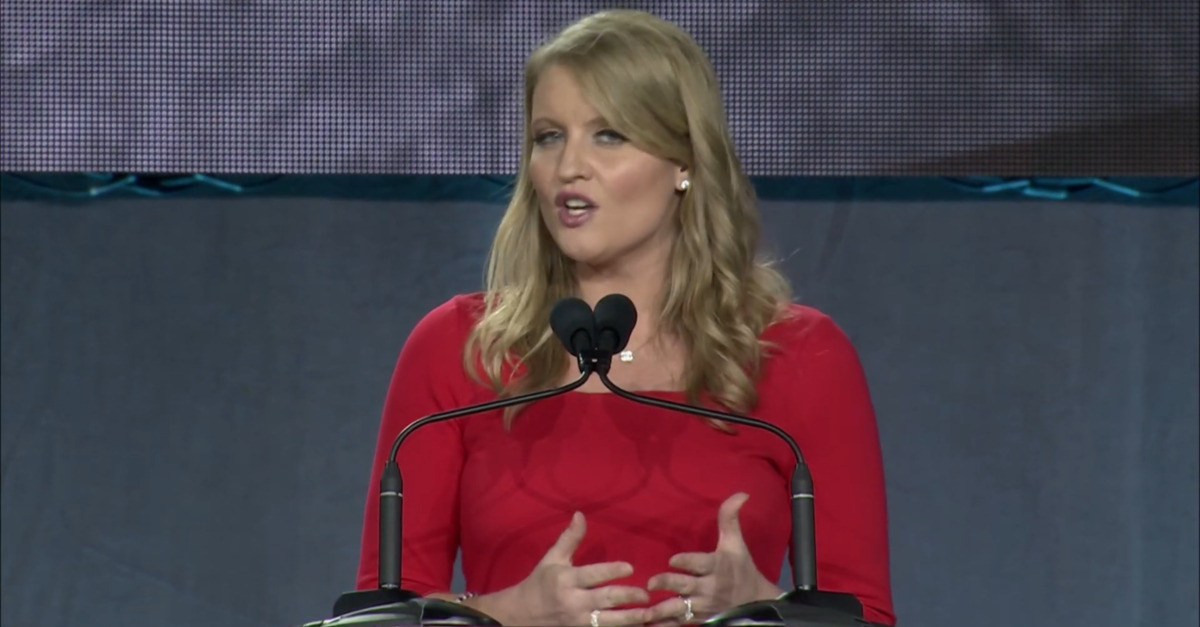
Trump campaign senior legal adviser Jenna Ellis was previously fired from her prior job as a low-level prosecutor for poor job performance.
According to records obtained by the Colorado Sun via the Colorado Open Records Act, Ellis was fired by the Weld County District Attorney’s office in 2013 because she repeatedly and consistently “made mistakes on cases” that should not have occurred.
“In this case, the employer discharged [Ellis] because she failed to meet the employer’s expectations 100 percent of the time,” a Hearing Officer’s Decision released by the Colorado Department of Labor and Employment notes.
After being fired over performance concerns, the prosecutor’s office appealed a decision granting her “a full award of unemployment insurance benefits.” A hearing then ensued in which the prosecutor’s office, appearing by telephone, gave their side and Ellis, appearing in person, gave her side. Ultimately, the state’s labor appeals board determined that Ellis was entitled to unemployment benefits.
The Weld County office’s attempt to claw back those benefits was underscored by their apparently overwhelming displeasure with how Ellis, a self-styled “constitutional law attorney” performed her job while prosecuting minor crimes like theft and assault.
“The employer discharged the claimant because the claimant made mistakes on cases the employer believed she should not have made,” the document notes.
A section of that document specifies one law that Ellis apparently failed at understanding or abiding by in particular:
There are federal laws and state statutes that regulate aspects of the process throughout each case. The employer noted some cases were being processed that did not adhere to the Victims Rights Act as it applies to the cases. There is the appearance in case documentation the claimant did not follow proper protocol for some of the cases she handled. The employer began tracking the claimant’s handling of cases and kept notes on issues the employer believed were not in compliance with accepted protocols and practices.
The Crime Victims Rights Act is likely familiar to readers up to speed on all the ins and outs of the Jeffrey Epstein scandal in South Florida–where multiple courts and internal government watchdogs have determined former U.S. Attorney Alex Acosta failed to abide by the auspices of that law when he entered into a controversial sweetheart deal with the dead pedophile and sex criminal.
But, the appeals board explains, Ellis wasn’t entirely at fault for her lackluster legal chops in the small office of eight attorneys.
“The claimant did the best she could with her education and training to meet the expectations of the employer,” the document notes.
The document goes on to substantially minimize Ellis’s culpability:
The number of cases noted that had errors were few when compared to the total number of cases handled by the claimant overall. Further, the number of errors that were not remedied was even fewer. When the claimant discovered an error either through her own actions or brought to her attention by someone else, she corrected the error as best possible. The claimant did not receive any written reprimands for her performance, only verbal coachings or warnings [by her supervisor Anthony Perea].
“The number of cases in which [Ellis] committed an irreparable, egregious act was not significant compared to the total number of cases she processed,” the document notes at another point.
But regardless of the degree to which Ellis’s apparently less-than-ideal lawyering was determined to be her own fault, the Weld County District Attorney’s Office clearly felt that she was responsible for her own mistakes–and aggressively moved to punish her for them after the fact by trying to deny her unemployment claim.
And, the documented circumstances surrounding her dismissal entirely contradict the narrative she’s put forward in the press.
A Wall Street Journal article from earlier this month notes:
Ms. Ellis confirmed she was fired as a Weld County prosecutor in early 2013. She said she was fired because she refused to bring a case to trial that she believed was an unethical prosecution. A spokeswoman for the Weld County district attorney’s office declined to comment, citing human-resources rules.
A New York Times exposé from early December separately explored Ellis’s lack of relevant experience practicing constitutional law, even as she helmed the president’s failed attempts to overturn the 2020 election results.
[image via screengrab/Centennial Institute/YouTube]